

State Farm is among the most recognizable brands in the industry, being the country’s largest property and casualty (P&C) insurer that controls almost a tenth of the entire market. Apart from this, it is the top provider of auto and home insurance in the US, taking up about a fifth of the overall share in both lines. These reasons alone make the company an attractive option for professionals wanting to pursue or continue a career as an insurance agent.
But how much do State Farm agents make? That is the question Insurance Business will provide answers to in this article. If you’re working out if taking a job as an agent for the Illinois-headquartered insurance giant is the best move for your career, then this guide can help you make an informed decision. Read on and find out what it takes to be a State Farm insurance agent.
Different employment websites provide varying figures on how much State Farm insurance agents make, that’s why it’s tough to come up with an exact amount. Even the insurer’s website doesn’t disclose how much insurance agents earn. But based on the data Insurance Business gathered, the median annual salary ranges between $36,000 and $47,000.
The table below shows the percentile wage estimates for State Farm agents across the country from this website, which also ranks the top-paying cities for the role.
|
PERCENTILE WAGE ESTIMATES (STATE FARM AGENTS) |
||||
|---|---|---|---|---|
|
Percentile |
Annual wage |
Monthly wage |
Weekly wage |
Hourly wage |
|
10th |
$28,250 |
$2,354 |
$543 |
$14 |
|
25th |
$36,500 |
$3,041 |
$701 |
$18 |
|
Average |
$47,365 |
$3,947 |
$910 |
$23 |
|
75th |
$54,000 |
$4,500 |
$1,038 |
$26 |
|
90th |
$65,000 |
$5,416 |
$1,250 |
$31 |
How much State Farm agents make is also influenced by where they sell policies. Because states impose varying rules on how insurance is sold and who can distribute such products, the average pay agents receive is likewise impacted. Here’s a list of the highest-paying cities for State Farm agents.
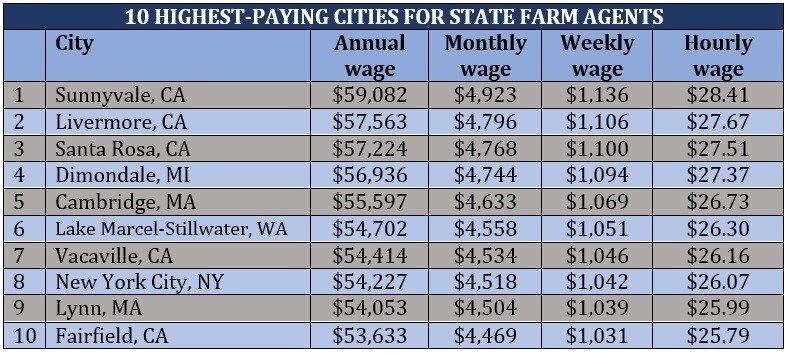
How much do State Farm agents make compared to those from the insurance giant’s main competitors? Here’s a summary of the data we gathered.
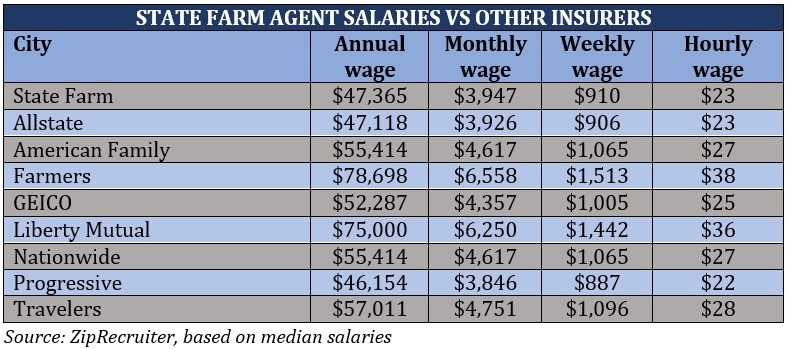
As you may have noticed, State Farm agent salaries are not among the highest in the list. Industry rivals Farmers and Liberty Mutual offer insurance agents significantly higher salaries, while the wages from Travelers, American Family, Nationwide, and GEICO are likewise above State Farm’s average. Only Allstate and Progressive give insurance agents slightly lower median salaries.
State Farm agents, however, can also earn income through commissions and other means. The insurer also offers a good benefits and compensation package. We will discuss these topics in more detail in the succeeding sections.
If you want to get an idea of how much insurance agents make in general, you can click on the link to access our guide.
On its website, State Farm listed the following benefits of being an insurance agent for the company:
In terms of compensation, State Farm’s offerings include:
The tables below sum up the benefits insurance agents can access are categorized into three areas:
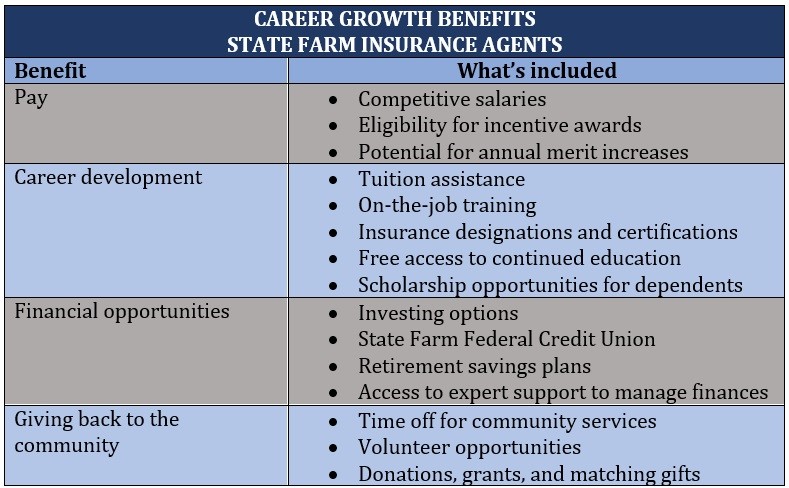
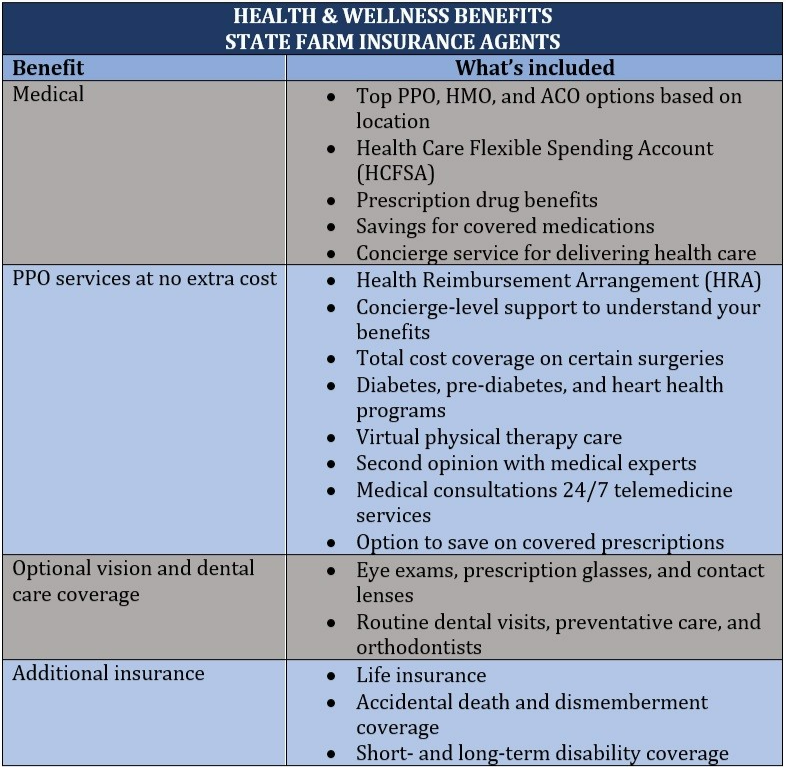
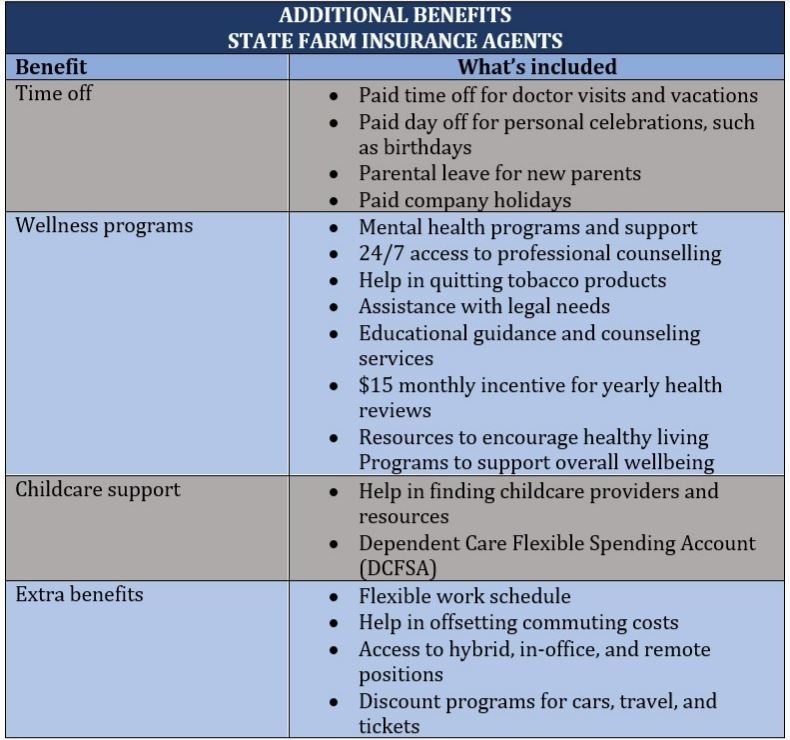
State Farm is constantly looking for candidates who share the company’s mission of “working like a good neighbor.” The insurer’s website lists the attributes it is looking for in a candidate, including:
If you feel that you have all the attributes listed above and have what it takes to be an independent State Farm insurance agent, you can jumpstart your way to your new career by undergoing these 10 steps.
You might have already seen him in a few State Farm commercials, but probably one of the more famous, if not the most famous, agents the company has had was the original Jake from State Farm. Jake Stone was an actual employee of the company but has since moved on. But still, the original Jake continues to have a loyal fan base, still claiming his place among the best insurance mascots of all time.
Apart from being the biggest P&C insurer in the country, State Farm tops the list of the largest home insurance companies in the US, controlling almost a fifth of the market. Among the policies under its home and property lines are:
State Farm also accounts for 17% of the nation’s entire auto insurance market based on the figures from the National Association of Insurance Commissioners (NAIC), ranking number one as well when it comes to the largest car insurance providers in the US. The following are the policies under State Farm’s car insurance portfolio:
Apart from these, State Farm offers the following coverages:
The question of whether State Farm is a great company to work for mostly depends on what your priorities are for your insurance career. If you’re looking for a company that is financially stable and provides job security, State Farm ticks the boxes being one of the largest insurers in the US and having a wide range of product offerings.
If you’re looking for an above-average salary, however, State Farm offers an amount that’s lower than most of its industry rivals, although the insurer makes up for this by providing insurance agents with a comprehensive list of benefits. In addition, the company’s commission-based structure for independent agents allows them to earn higher wages the more policies they sell. The drawback to this, based on employee reviews Insurance Business checked out, is that the pressure to sell more can often lead to burn out and exhaustion.
At the end of the day, the best insurance employers are those that provide highly competitive compensation coupled with a positive workplace culture. If you want to know which industry players made our list of the top insurance companies to work for in the US, be sure to click on the link.
Typically, the position with the highest salary at State Farm is that of chief executive officer (CEO).
The CEO is responsible for supervising the company's overall operations, establishing strategic objectives, and making crucial decisions that contribute to the company's success. Their contributions are essential to the organization's leadership, financial management, and long-term growth and profitability.
As in many other large corporations, the State Farm CEO's compensation consists of various components, such as a base salary, bonuses, stock options, and other incentives. Depending on the CEO's performance and the company's financial performance, the precise compensation package can vary.
Apart from the CEO, State Farm provides rewarding career opportunities for individuals in key executive positions such as Chief Financial Officer (CFO), Chief Operating Officer (COO), and Chief Marketing Officer (CMO). These roles play a pivotal role in driving the company's success and are rewarded with competitive compensation packages.
Salaries of executives at State Farm are subject to scrutiny and can be influenced by a variety of circumstances, just like it is at other organizations. The company's financial success, relative positioning in its industry, and compliance with corporate governance best practices are all relevant considerations.
Local State Farm agents represent the insurance company and serve as liaisons between State Farm and its policyholders. They offer customized insurance products and services to individuals and enterprises in their respective communities.
State Farm agents play a vital function in assisting clients to comprehend and select the most suitable insurance coverage for their needs. They evaluate the risks and insurance needs of each client and offer policies that provide adequate coverage.
State Farm agents assist clients throughout the claims process in addition to selling insurance policies. When clients suffer losses or damages covered by their policies, local agents direct them through the claims filing process and collaborate with the insurance company to reach a fair and timely resolution.
Local State Farm agents frequently participate in community engagement and networking events to develop relationships and establish a strong presence in their respective communities. They may support community initiatives, collaborate with other enterprises, and sponsor local events.
In addition, State Farm agents prioritize providing superior customer service, maintaining consistent communication with their clients, and addressing any inquiries or concerns that may arise during the policy period.
Local State Farm agents are the face of the company in their respective communities, providing customized insurance solutions, assisting with claims, and engaging with the local populace. Their role is crucial in establishing client trust, providing quality service, and fostering long-lasting relationships.
The earnings of a top State Farm agent can vary significantly based on sales performance, customer base size, and geographic location. However, top-performing State Farm agents can earn a substantial income through commission-based compensation and performance-based incentives.
On the insurance policies they sell, State Farm agents receive a commission, which can be a percentage of the customer's premium. As top agents typically generate a greater volume of sales, their commission income can be substantial.
In addition, State Farm offers incentives and compensation based on performance to agents who meet specific sales goals or business objectives. These incentives can increase the earnings of high-performing agents even further.
The location of a State Farm agent's office influences their earnings as well. Agents in larger locations or high-demand regions may have access to a larger customer base. Commission opportunities there are potentially higher.
While top State Farm agents have the potential to earn a lucrative income, their earnings are not fixed and can vary based on market conditions, business performance, and other factors.
To summarize, a top State Farm agent's earnings are determined by their sales performance, customer base, location, and performance-based incentives. Successful State Farm agents can earn a substantial income through commission-based compensation and prospective bonuses, but their earnings can vary depending on several factors.
State Farm agents create leads through a variety of methods such as referrals, networking, web marketing, and community involvement.
State Farm agents get most of their leads from referrals. If a client is satisfied with the service they received, they are more likely to recommend the agent to their friends, family, and coworkers. New customers can be acquired through word-of-mouth advertising.
Networking is essential for lead creation. State Farm representatives routinely attend local business events, community gatherings, and industry meetings to meet new clients and network with other professionals who can recommend leads.
Another successful way for State Farm agents to generate leads is through online marketing. They keep up a sizable profile in the digital world by means of domain names, social media, and paid promotion. Leads and customers could be drawn by interesting content and useful tools.
State Farm agents must interact in the community to position themselves as trusted local experts. State Farm agents also use traditional marketing strategies to reach out to potential customers, such as direct mail and print advertising.
State Farm agents may draw a continuous supply of potential clients by combining these lead generation tactics, helping them to develop their business and serve more consumers successfully.
Do you think being a State Farm agent is a good career? Is the role worth it if you consider how much State Farm agents make? Chat us up in the comments section below.
